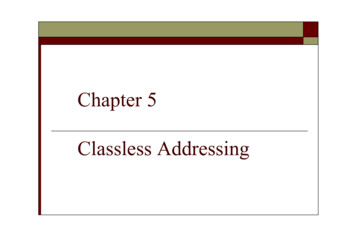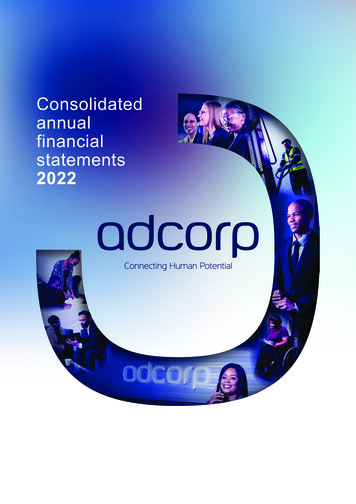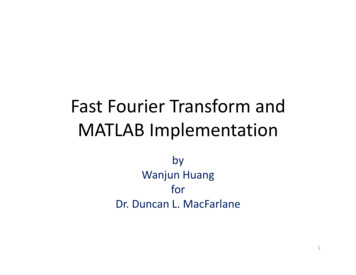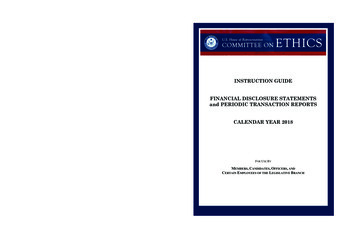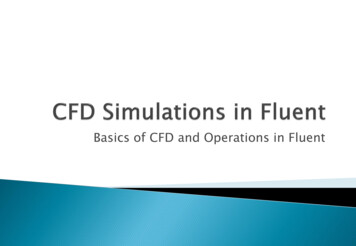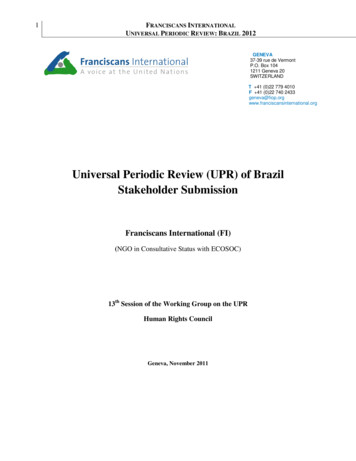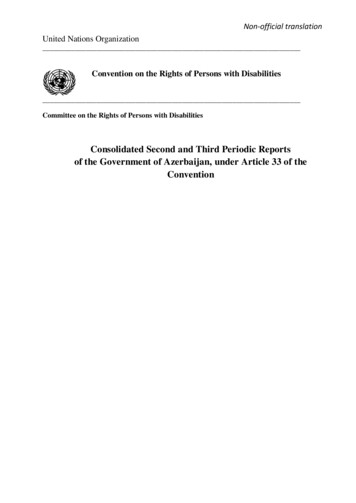
Transcription
Non-official translationUnited Nations OrganizationConvention on the Rights of Persons with DisabilitiesCommittee on the Rights of Persons with DisabilitiesConsolidated Second and Third Periodic Reportsof the Government of Azerbaijan, under Article 33 of theConvention
ContentsContents . 2Abbreviation list . 4Preparation of report . 5A.Purpose and general obligations (Articles 1-4). 6Law of the Republic of Azerbaijan on the Rights of Persons with Disabilities . 6Innovative reforms using Information Communication Technology (ICT) in the field of disabilityassessment . 7Criteria for Assessing Disability . 8Preventing discrimination on the basis of disability . 9Monitoring the implementation of the obligations under the Convention . 10Participation of persons with disabilities in public decision-making process of the organizations . 10Azerbaijani Sign Language . 12B.Specific Rights (Articles 5 -30) . 12Equality and non-discrimination (Article 5) . 12Legislative and policy measures against discrimination on the basis of disability. 12Ethnic and religious freedom . 13Women with Disabilities (Article 6) . 14Legislative and policy measures to prevent multiple and intersecting discrimination, including domesticand sexual violence against women and girls with disabilities . 15Sexual and reproductive health rights of women and girls with disabilities . 15Cases of sexual violence against women and girls with disabilities . 16Gatekeeping for children with disabilities . 17Support and training for children with ldisabilities subjected to violence. 18Awareness-raising (Article 8) . 19Awareness campaigns . 19Accessibility (Article 9) . 23Measures to ensure accessibility . 23Accessibility and universal design for the public and private sectors . 24Right to life (Article 10) . 25Situations of risk and humanitarian emergencies (Article 11) . 26Equal recognition before the law (Article 12) . 26Access to justice (Article 13) . 27Liberty and security of the person (Article 14) . 28Freedom from torture or cruel, inhuman or degrading treatment or punishment (Article 15) . 28Freedom from exploitation, violence and abuse (Article 16) . 30Protection of the integrity of the person (Article 17) . 312
Living independently and being included in the community (Article 19) . 33Inclusive education . 33Personal mobility (Article 20). 34State Program on Road Safety (2019-2023) . 34The "Accessible Metro" project . 35Talking library. 35Access to websites of government agencies . 36The "Talking book" project . 36Respect for home and the family (Article 23). 37Education (Article 24). 37State Program on Development of Inclusive Education (2018-2024) . 37Work and employment (Article 27). 39"E-social" Internet portal . 41Reasonable accommodation . 42Participation in political and public life (Article 29) . 43Participation in cultural life, recreation, leisure and sport (Article 30) . 44C. Specific Obligations (Articles 31-33). 46Statistics and data collection (Article 31) . 46International Cooperation (Article 32) . 47National Implementation and Monitoring (Article 33). 47Coordination mechanisms for insuring implementation of the Convention . 47The mandate of and activities carried out by the Commissioner for Human Rights of the Republic ofAzerbaijan to monitor the implementation of the Convention . 48Capacity Building of the Office of the Commissioner for Human Rights of the Republic of Azerbaijan . 493
Abbreviation listBPBritish PetroleumBTABaku Transport AgencyCECCentral Election CommissionCLConstitutional LawCPHRCentre for Public Health and ReformsCPTEuropean Committee for the Prevention of TortureESSEmployment Sub-SystemEUEuropean UnionICTInformation Communication TechnologyInstituteAzerbaijan Ombudsman InstituteISGEIInformation System of the General Education InstitutionsLSCYPNALeadership School of the Child and Youth Peace Network of AzerbaijanMLSPPMinistry of Labour and Social Protection of PopulationMSECMedical and Social Expert CommissionsMTCHTMinistry of Transport, Communication and High TechnologyNAPGENational Action Plan on Gender EqualityNew LawNew Law of the Republic of Azerbaijan "On the Right of Persons withdisabilities"NGONon-Governmental OrganizationsNPGNational Preventive GroupTSERASSubsystem of Medical and Social Expertise and RehabilitationUNUnited NationsUNDPUnited Nations Development ProgrammeUNECAzerbaijan State Economic UniversityUNESCAPUnited Nation Economic and Social Commission forAsia and the PacificUNICEFUnited Nations Children’s Fund4
Introduction1. The Government of the Republic of Azerbaijan submits to the United Nations (UN) Committeeon the Rights of Persons with Disabilities simplified second and third periodic reports on theimplementation of the Convention on the Rights of Persons with Disabilities (Convention). TheGovernment of the Republic of Azerbaijan ratified the UN Convention on the Rights of Personswith Disabilities and its Optional Protocol on January 28, 2009, and in February, 2011 theGovernment submitted its initial report on measures to promote and protect the rights of personswith disabilities to the UN Committee on the Rights of Persons with Disabilities.2. This report reflects the activities made to ensure all the rights and freedoms of persons withdisabilities as well as to promote and protect these rights provided by the "United NationsConvention on the Rights of Persons with Disabilities" to which the Republic of Azerbaijan hasjoined.Preparation of report3. The consolidated second and third periodic reports of the Republic of Azerbaijan on theimplementation of the UN Convention on the Rights of Persons with Disabilities has been preparedbased on information obtained on the activities of state bodies on the issues mentioned in the list ofquestions approved by the Committee and to be answered by the Government of the Republic ofAzerbaijan.4. The 2 nd and 3rd consolidated reports of the Republic of Azerbaijan on the implementation of theUN Convention on the Rights of Persons with Disabilities have been prepared by the WorkingGroup established by the Executive Order No. 504 of the President of the Republic of Azerbaijan ofSeptember 20, 2018 "On Enhancing the Effectiveness of Cooperation with UN Human RightsMechanisms" based on information provided by the relevant ministries and committees.5. In connection with this Executive Order a working group consisting of relevant governmentagencies has been established for the preparation of periodic reports of the Republic of Azerbaijanand to ensure control over the implementation of the recommendations adopted in relation to theRepublic of Azerbaijan within the UN Human Rights Treaty bodies and the Universal PeriodicReview mechanism of the UN Human Rights Council. Management of activities of that WorkingGroup was entrusted to the Ministry of Foreign Affairs.6. Representatives of the Prosecutor General and the Commissioner for Human Rights(Ombudsman) of the Republic of Azerbaijan also attend the meeting of the Working Group.7. Information from Non-Governmental Organizations (NGOs), especially organizations of personswith disabilities was used in the preparation of the report.5
A.Purpose and general obligations (Articles 1-4)a)Law of the Republic of Azerbaijan on the Rights of Persons with Disabilities8. On May 31, 2018, a new Law of the Republic of Azerbaijan "On the Rights of Persons withDisabilities" (New Law) was adopted. Respect for all rights and freedoms provided by theConvention on the Rights of Persons with Disabilities, including the basic principles of state policy,state guarantees in this area, disability prevention, rehabilitation, employment, social security ofpersons with disabilities, other important issues are covered by this New Law.9. Updated "Common Core Document" submitted by the Government of the Republic of Azerbaijanto the UN High Commissioner for Human Rights on October 20, 2017 and updated information onthe document dated 2019, contains relevant measures in the area of protection and promotion ofhuman rights, including the protection of the rights of persons with disabilities.10. Due to implementation of the Decree of the President of the Republic of Azerbaijan of July 18,2018 No 213 "On the Application of the Law of the Republic of Azerbaijan On the Rights ofPersons with Disabilities" of May 31, 2018 No. 1153-VQ, legislation has been improved. This is aradical reform aimed at shifting from a traditional medical model of disability to a social modelbased on human rights and adaptation of the national legislation to Convention.11. Among the drafts under preparation "Regulations of reasonable accommodation of theinfrastructure facilities for use of Persons with Disabilities" which is being prepared, taking intoconsideration the Committee's general comment number 6 (2018) on equality and nondiscrimination; “Regulation for establishing a unified electronic register on persons with disabilitiesand disability; as well as anIndividual Rehabilitation Program which includes implementation ofsocial rehabilitation should be noted.12. In connection with application of a Decree on the implementation of the New Law the Ministryof Labour and Social Protection of Population of the Republic of Azerbaijan (MLSPP) hasdeveloped and submitted to the Government the relevant draft laws for the purposes of replacing theterm "disabled" with the term "person with disability", exclusion of offensive terms from thenational legislation, depending on the context replacing the word "defect" with the term"impairment", the term "cripple" with the term "disability", the term "imbecile" with the expression"mental impairment", the words "dumb", "deaf", "blind" with the expression "a person with avisual, hearing or speech impairment" in the Code of Administrative Offenses approved by the Lawof the Republic of Azerbaijan of December 29, 2015 No. 96-VQ, in the Labour Code approved bythe Law of the Republic of Azerbaijan "On approval, entry into force of the Labour Code of theRepublic of Azerbaijan and legal regulation in this regard" of February 1, 1999, No 618-IQ, in theLand Code approved by the Law of the Republic of Azerbaijan "On approval of the Land Code ofthe Republic of Azerbaijan" No 695-IQ of June 25, 1999, in the Family Code approved by the Lawof the Republic of Azerbaijan "On approval, entry into force of the Family Code of the Republic ofAzerbaijan and legal regulation in this regard" of December 28, 1999, No. 781-IQ, in the CivilCode of the Republic of Azerbaijan approved by the Law of the Republic of Azerbaijan "Onchanging the validity period of the Civil Code of the Republic of Azerbaijan, the Code of Civil6
Procedure of the Republic of Azerbaijan and the Criminal Code of the Republic of Azerbaijan" ofMay 26, 2000, in the Tax Code approved by the Law of the Republic of Azerbaijan "On approval,entry into force of the Tax Code of the Republic of Azerbaijan and legal regulation in this regard"of July 11, 2000 No 905-IQ, in the Customs Code approved by the Law of the Republic ofAzerbaijan "On Amendments to the Customs Code of the Republic of Azerbaijan" of December 28,2018, No 1431-VQD, in the Code of Urban Planning and Construction approved by the Law of theRepublic of Azerbaijan "On Amendments to the Code of Urban Planning and Construction of theRepublic of Azerbaijan" of March 5, 2019, No 1525-VQD, in the Migration Code approved by theLaw of the Republic of Azerbaijan "On Amendments to the Migration Code of the Republic ofAzerbaijan" of June 27, 2019, No 1623-VQD, in the Election Code approved by the Law of theRepublic of Azerbaijan "On approval and entry into force of the Election Code of the Republic ofAzerbaijan" of May 27, 2003, No 461-IIQ, as well as in the Law "On the Rights of the Child" ofMay 19, 1998, No. 499-IQ, in the Law "On Road Traffic" of November 22, 1998, No. 24, in theLaw "On Courts and Judges" of June 10, 1997, No. 310-IQ, in the Law "On Freedom of Religion"of August 20, 1992, No. 281, in the Law "On perpetuating of name of the martyr and aboutprivileges to families of martyrs" of September 3, 1993, No. 697 and in other relevant laws.b)Innovative reforms using Information Communication Technologies (ICT) in the field ofdisability assessment13. Subsystem of Medical and Social Expertise and Rehabilitation (TSERAS) was created withinthe centralized electronic information system of the MLSPP as the implementation of the 1 st part ofthe Presidential Decree "On Improvement of the System of Assessment of Disability and Limitationof Health capabilities" of September 15, 2015, No. 595.14. Improvements in TSERAS have been made in accordance with the Order of the Cabinet ofMinisters of the Republic of Azerbaijan "On approval of the Regulation on Medical and SocialExpert Commissions" of February 5, 2016 No 366 and the amendment to this Resolution ofNovember 11, 2016, No 446 and the disability status of citizens is assessed by the Medical andSocial Expert Commissions (MSEC) through TSERAS on the basis of referrals from public healthinstitutions without the presence of a person, and citizens are notified via SMS about the decision(duration and degree of disability or refusal). In addition, citizens can receive information about theresults of the assessment freely and without interference, using the "Providing information onmedical examinations conducted by the Medical and Social Expert Commissions" electronic servicein the e-Government portal, as well as using the interactive menu by calling the Call Centre 142-0.15. It should be noted that the advanced automated IT systems of the MLSPP, as well as theTSERAS have been posted within the South-South Partnership Programme on the UN portal"Cooperation Mechanisms and Solutions in the framework of South-South Cooperation in the ArabCountries, Europe and CIS" recomended for the other South countries by UN as an adviseable,modern, efficient and transparent working solution. Besides, this system in the field of disabilityassessment was recognized by the International Social Security Association (ISSA) in theCompetition for the Good Practice Award for Europe and won a special award of ISSA. At the7
same time, this experience of Azerbaijan has been studied and implemented by the Republic ofKazakhstan.16. In addition, granting of disability pension is also being implemented using the electronic systemin connection with the implementation of Section 2.4.3 of the Presidential Decree "On expandingthe application of electronic services in the areas of labour, employment, social protection andsocial security" of September 5, 2018, No. 258.17. Now, as granting of old age pensions, granting of disability pensions has started to be providedproactively without any application or submitting any documents. When there’s a right of a personwith a disability to a pension, he/she is granted the pension on the day of eligibility and is notifiedelectronically in this regard (including the amount of the pension, the bank branch and time tocollect a VISA card) by SMS, email or official letter.Criteria for Assessing Disability18. New “Regulations on criteria for disability assessment" have been developed by the MLSPP forensuring implementation of the paragraph 1.1.5 of Decree of the President of the Republic ofAzerbaijan on the implementation of the New Law and posted on the official website of the MLSPPfor public dicussions and feedback, comments and suggestions from civil society institutions,individual citizens, specialists and experts for organization of public hearings. At the same time, theproject was also discussed within the Public Council, which operates under the Ministry and aswell includes organizations of persons with disabilities.19. A special working group has been established at the Ministry of Labour and Social Protection toensure that the criteria for disability assessment are developed in line with the best internationalpractices. The working group analysed the best international practices in the field of the disabilityassessment, studied the experience of Russia, Austria, Great Britain, USA and Germany, reviewedthe European Union's (EU) "Physical and mental disability rating scale", 10th edition of theInternational Classification of Diseases (ICD) and the International Classification of Functioning(ICF).20. The new project on the "Criteria of disability assessment" also includes criteria for determiningdisability based on disease allocation under ICD-10, of the World Health Organization, acomprehensive and detailed description of persistent impairments in the human body, 10-100%range of persistent impairments in the human body's function, as well as the extent of restrictionarising from his impairments of the seven main categories of human activities, such as selfcare, freemovement, orientation, communication, behaviour control, learning and employment.21. The classifications and categories used in this project address the opportunities of socialrehabilitation and adaptation in disability assessment and thus shifting from a traditional medicalmodel of disability to a social model based on human rights, allowing evaluation of the impact levelon the life of a person resulting from diseases and their severity rates, but not isolated from them, asopposed to the traditional approach to determining disability.8
c)Preventing discrimination on the basis of disability22. Amendments were made to the Constitution of the Republic of Azerbaijan in a nationwidevoting (referendum) held on September 26, 2016. Section VI is added to Article 25 of theConstitution: "VI. Persons with disabilities enjoy all rights and bear duties enshrined in thisConstitution, except for the rights and duties which are difficult for them to be implemented due totheir disabilities."23. The New Law providing for the elimination of all forms of discrimination on the basis ofdisability, full participation of persons with disabilities in society and creation of conditions fortheir social inclusion, full and equal exercise of rights and freedoms, protection of their honour anddignity, reflects a reasonable accommodation of the facilities for the needs of persons withdisabilities. As mentioned above, "The regulation of reasonable accommodation of theinfrastructure facilities for use of Persons with Disabilities" has been developed guided by theCommitee’s General comment number 6 (2018) on equality and non-discrimination.24. The Ministry of Labour and Social Protection of Population of the Republic of Azerbaijan inconnection with the implementation of the Decree of the Prezident of the Republic of Azerbaijan onthe implementation of the New Law has developed and submitted to the Government the relevantdraft laws for the purposes of replacing the term "disabled" with the term "person with disability",exclusion of offensive terms from the national legislation, depending on the context replacing theword "defect" with the term "impairment", the term "cripple" with the term "disability", the term"imbecile" with the expression "mental impairment", the words "dumb", "deaf", "blind" with theexpression "a person with a visual, hearing or speech impairment" in the Code of AdministrativeOffenses approved by the Law of the Republic of Azerbaijan of December 29, 2015 No. 96-VQ, inthe Labour Code approved by the Law of the Republic of Azerbaijan "On approval, entry into forceof the Labour Code of the Republic of Azerbaijan and legal regulation in this regard" of February 1,1999, No 618-IQ, in the Land Code approved by the Law of the Republic of Azerbaijan "Onapproval of the Land Code of the Republic of Azerbaijan" No 695-IQ of June 25, 1999, in theFamily Code approved by the Law of the Republic of Azerbaijan "On approval, entry into force ofthe Family Code of the Republic of Azerbaijan and legal regulation in this regard" of December 28,1999, No. 781-IQ, in the Civil Code of the Republic of Azerbaijan approved by the Law of theRepublic of Azerbaijan "On changing the validity period of the Civil Code of the Republic ofAzerbaijan, the Code of Civil Procedure of the Republic of Azerbaijan and the Criminal Code of theRepublic of Azerbaijan" of May 26, 2000, in the Tax Code approved by the Law of the Republic ofAzerbaijan "On approval, entry into force of the Tax Code of the Republic of Azerbaijan and legalregulation in this regard" of July 11, 2000 No 905-IQ, in the Customs Code approved by the Law ofthe Republic of Azerbaijan "On Amendments to the Customs Code of the Republic of Azerbaijan "of December 28, 2018, No 1431-VQD, in the Code of Urban Planning and Construction approvedby the Law of the Republic of Azerbaijan "On Amendments to the Code of Urban Planning andConstruction of the Republic of Azerbaijan" of March 5, 2019, No 1525-VQD, in the MigrationCode approved by the Law of the Republic of Azerbaijan "On Amendments to the Migration Codeof the Republic of Azerbaijan" of June 27, 2019, No 1623-VQD, in the Election Code approved bythe Law of the Republic of Azerbaijan "On approval and entry into force of the Election Code of9
the Republic of Azerbaijan" of May 27, 2003, No 461-IIQ, as well as in the Law "On the Rights ofthe Child" of May 19, 1998, No. 499-IQ, in the Law "On Road Traffic" of November 22, 1998, No.24, in the Law "On Courts and Judges" of June 10, 1997, No. 310-IQ, in the Law "On Freedom ofReligion" of August 20, 1992, No. 281, in the Law "On perpetuating of name of the martyr andabout privileges to families of martyrs" of September 3, 1993, No. 697 and in other relevant laws.d)Monitoring the implementation of the obligations under the Convention25. The Council on State Support to Non-Governmental Organizations under the President of theRepublic of Azerbaijan provided NGOs with information, consultative, methodological andorganizational-technical assistance to protect the rights of persons with disabilities, as well as travelgrants were allocated for participation of the representatives of those NGOs in international events.26. There is a mutual cooperation between the Commissioner for Human Rights and civil societyinstitutions, in particular persons with disabilities and the NGOs representing them, which isimportant for their involvement in the process of monitoring the implementation of the obligationsarising from Convention. Thus, representatives of the "Union of Disabled People Organizations"(the exact translation of the name of organization), which currently unite several same profileNGOs, are also members of the Expert Council under the Ombudsman, as well as the Business andHuman Rights Working Group.27. Legal awareness events held annually at the initiative of the Ombudsman, such as the HumanRights Month, Child Rights Month and Peace Month, have made significant contributions to thepromotion of the rights of all social groups, including the rights of persons with disabilities.28. In addition, as the Ombudsman's Resource Centres at the Leadership School of the Child andYouth Network of Azerbaijan and the Elderly Resource Centre trainings on the rights of personswith disabilities for members of these organizations are held.29. On December 3, 2016, on the occasion of the International Day of Persons with Disabilities andthe 10th anniversary of the adoption of the UN Convention on the Rights of Persons withDisabilities, Conference titled "The Convention on the Rights of Persons with Disabilities - 10years: Work Done and Future Tasks" was held at the Office of the Commissioner for Human Rightswith participation of the representatives of the Ministry of Labour and Social Protection ofPopulation, other relevant government agencies, civil society, NGOs and media representing suchpeople.e)Participation of persons with disabilities in public decision-making process of the organizations30. An awareness-raising project "Sun for All" was implemented by the State Committee forFamily, Women and Children Affairs in 2015-2016 to increase attention and care for persons withdisabilities, to involve the community in addressing their problems, to identify children and theirfamilies who need special care, ensure their inclusion and development in society.10
31. The State Committee for Family, Women and Children Affairs has been consistently working todiscover cinematography skills of children with disabilities, as well as their integration into society.Films and social videos on the relevant topics presented to the Organizing Committee are presentedannually to the executive authorities (district and city) for use in awareness-raising activities, aswell as at events held by the Committee.32. Work on the development, integration and social mobilization of children with disabilities isunderway by providing their participation at the events-forums, summer schools, children's rightstrainings, master classes in creativity held by the State Committee for Family, Women and ChildrenAffairs. The Committee holds various entertaining, artistic events for providing moral support tochildren with disabilities, to draw public attention to them, as well as to strengthen their integrationinto society on special (World Down Syndrome Day, International Childhood Cancer Day,International Day of Persons with Disabilities) and on prominent (Novruz and Eid al-A
UNEC Azerbaijan State Economic University UNESCAP United Nation Economic and Social Commission for Asia and the Pacific UNICEF United Nations Children's Fund. 5 Introduction 1. The Government of the Republic of Azerbaijan submits to the United Nations (UN) Committee on the Rights of Persons with Disabilities simplified second and third .
